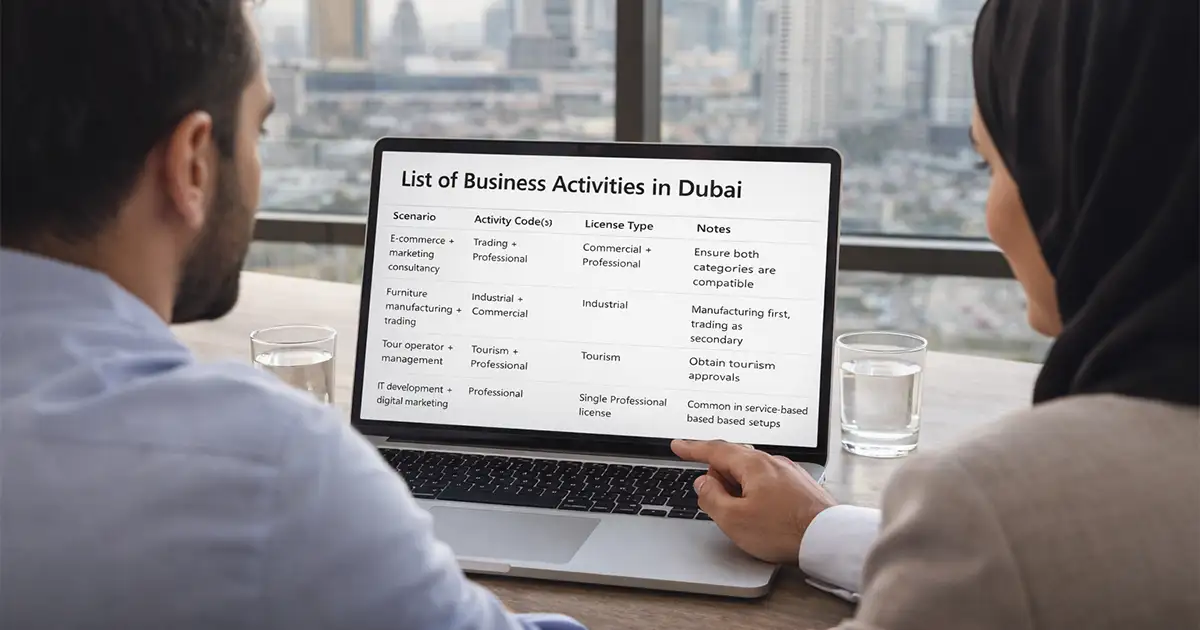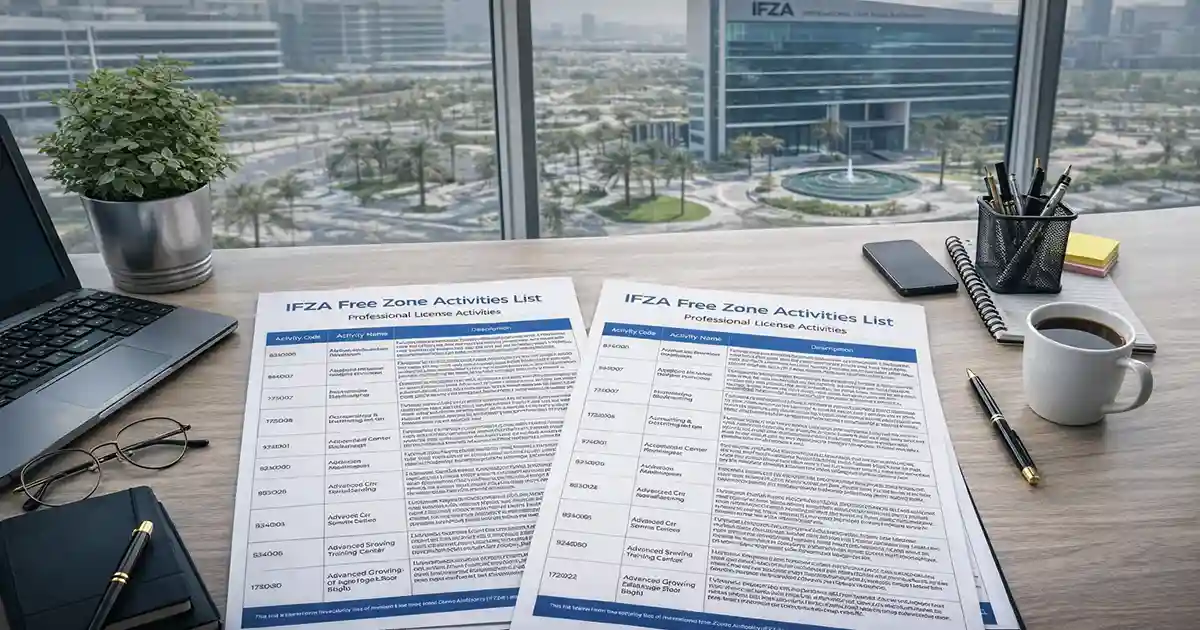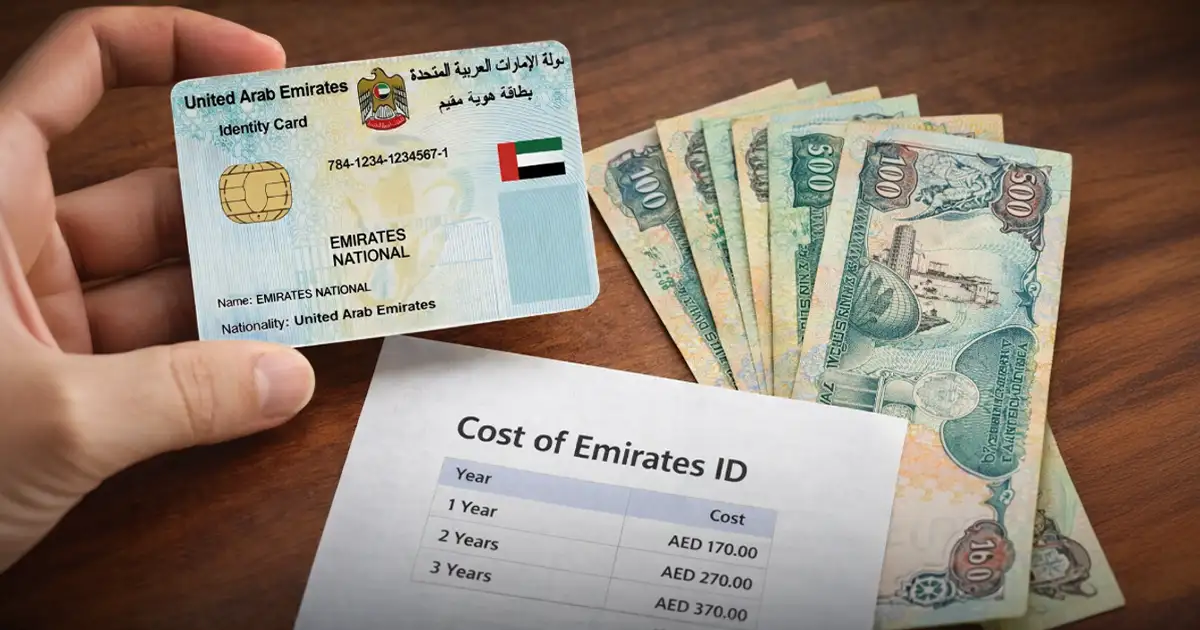Process of Registering a Company in a Dubai Free Zone
The process of registering a company in a Dubai Free Zone is streamlined and efficient, involving several clear steps to ensure your business is set up quickly and compliantly.
Step 1: Select The Right Free Zone
Your first major decision is choosing the right free zone. With over 40 free zones in Dubai, this choice will significantly influence your business environment. It’s essential to align the zone’s focus with your company’s goals.
- Match Your Industry: If you are in media, consider Dubai Media City. For technology, look at Dubai Internet City or Dubai Silicon Oasis. For general trading, Jebel Ali Free Zone (JAFZA) or Dubai Multi Commodities Centre (DMCC) are excellent choices.
- Consider Your Budget: The cost to register a company in a Dubai Free Zone varies widely between zones. Research the license costs in Dubai and office rent to choose the zone that best fits your financial plan.
- Evaluate Location: Consider the strategic location of the free zone. Choose a zone near a major port like JAFZA, an international airport like Dubai Airport Freezone (DAFZA), or a central business district, depending on your business needs.
- Check for Specific Incentives: Some zones offer unique incentives, like specialized startup incubators, funding opportunities, or specific infrastructure for manufacturing.
Step 2: Decide Your Legal Structure
Next, you need to choose a legal structure for your company. This decision impacts your ownership and operational framework. Free zones typically offer three main options:
- Free Zone Establishment (FZE): This structure is for a company with a single shareholder. It can be an individual or another company. An FZE is ideal for solo entrepreneurs or sole proprietors.
- Free Zone Company (FZCO/FZC): This is for businesses with 2 to 50 shareholders. Shareholders can be individuals or corporate entities. This is the most common choice for partnerships and multi-owner ventures.
- Branch Office: If you already have an existing company, either in the UAE mainland or abroad, you can register it as a branch in a free zone. The branch must perform the same activities as its parent company.
Read more: How to Open a Branch Office in Dubai?
Step 3: Reserve A Trade Name
Your business needs a name. This name must be unique and comply with UAE naming regulations. The free zone authority must approve your chosen name before you can proceed.
Follow these simple rules for trade name selection:
- The name must not already be registered by another company.
- It should not contain offensive language or references to any religion or political group.
- The name must reflect your business activity.
- It must end with its legal abbreviation, such as “FZE” or “FZCO.”
You will submit three name options to the free zone authority. Once approved, you pay a reservation fee, which is typically around AED 620.
Step 4: Prepare Application And Documents
This step involves gathering all the necessary paperwork. Being organized here will speed up the entire process.
For shareholders and directors, you will generally need:
- High-quality color passport copies.
- A recent passport-sized photograph with a white background.
- Proof of residential address (like a recent utility bill).
- A copy of your UAE entry stamp or residence visa, if you are already in the country.
- A No Objection Certificate (NOC) from your current sponsor if you hold a UAE residence visa.
- A detailed business plan is mandatory for certain regulated activities.
Most free zones provide templates for the Memorandum of Association (MOA) and Articles of Association (AoA), simplifying the legal documentation.
Step 5: Obtain Initial Approvals
Once you prepare your documents, submit them with your application form and trade name approval to the free zone authority. The authority reviews your application to ensure it meets all requirements. This stage is known as obtaining the initial approval.
For most standard business activities, this approval is granted quickly. However, if your business falls into a specialized sector, such as healthcare, education, or food trading, you may need additional approvals. These approvals come from external government bodies like the Dubai Health Authority (DHA) or Dubai Municipality.
Step 6: Lease Office Or Desk Space
Every company registered in a Dubai free zone needs a physical address within that zone. The lease agreement for your office space is a mandatory part of the registration.
Free zones offer a variety of options to suit different needs and budgets:
- Flexi-Desk: A shared desk space, perfect for startups and freelancers.
- Shared Office: A dedicated desk in a shared office environment.
- Private Office: A fully furnished, serviced office for your team.
- Warehouse: For businesses involved in logistics, trading, or manufacturing.
Your choice of office space will directly impact your total cost and the number of residence visas your company is eligible for.
Step 7: Pay Registration And License Fees
With your initial approval and lease agreement in hand, it is time to make the payment. This is a critical step in finalizing your company setup.
The costs are broken down into two main categories:
| Fee Type | Cost (AED) | Notes |
|---|---|---|
| Registration Fee | From 9,000 (one-time) | Varies by free zone and structure (e.g., DMCC) |
| License Fee | 10,000 – 50,000 / year | Depends on business activity |
Once you pay these fees, you will sign all the final legal documents, including the MOA and lease agreement.
Know more: How Much Does it Cost to Set Up a Company in the UAE?
Step 8: Get Your Trade License And Company Registration
This is the moment you have been working towards. After the free zone authority processes your payment and signed documents, Trade License will issue your official business license.
You will receive a package of documents, including:
- Your Trade License.
- The Certificate of Incorporation.
- Your company’s Share Certificates.
- The signed Memorandum and Articles of Association.
- Your office lease agreement.
Most free zones issue licenses within 7 to 15 business days. With these documents, your company is legally registered and ready to operate.
Step 9: Open a Bank Account And Apply For Visas
Your trade license is the key to unlocking the final steps. The first thing you should do is open a corporate bank account. Dubai has a robust banking sector, and your free zone can often recommend banks that are familiar with their clients.
Next, you can begin the visa process. As a business owner, you are eligible for an investor or partner visa. You can also apply for residence visas for your employees. You will submit visa applications through the free zone’s dedicated portal or service desk, which manages the process with the immigration authorities.
Step 10: Start Operations And Maintain Compliance
Congratulations! You now know how to open a company in the Dubai Free Zone and are ready to start your business operations. As you grow, it is crucial to stay compliant with the free zone’s regulations.
Key compliance tasks include:
- Renewing your trade license annually.
- Renewing staff and investor visas on time.
- Maintaining proper accounting and bookkeeping records.
- Filing Economic Substance Regulations (ESR) and Ultimate Beneficial Ownership (UBO) declarations as required by UAE law.
Staying compliant ensures your business runs smoothly and avoids any penalties.





